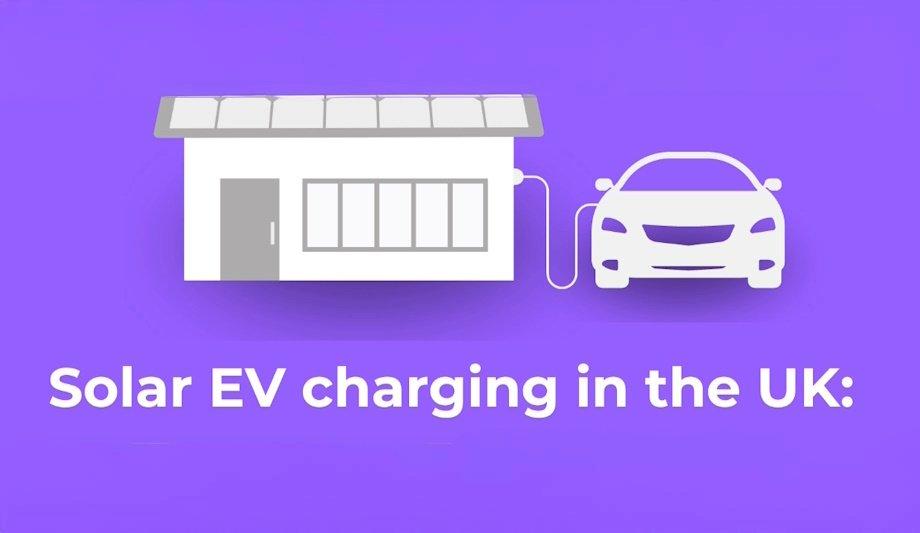In recent years, the United Kingdom has been making remarkable strides in both the adoption of electric vehicles (EVs) and the expansion of renewable energy sources.
As the world collectively turns its attention towards sustainable transportation and reducing carbon emissions, a fascinating and promising trend has emerged: the integration of solar EV charging infrastructure. This innovative approach not only promotes the use of clean energy but also contributes to the growth of electric mobility in the UK.
Solar EV Charging
The concept of solar EV charging is relatively straightforward: harnessing the power of the sun to charge electric vehicles. This process involves installing solar panels at charging stations, allowing them to generate electricity directly from sunlight.
The generated solar energy can then be used to charge electric vehicles, reducing the reliance on fossil fuels and lowering the overall carbon footprint of transportation.
The UK’s Solar Transformation
Advancements in solar technology have made solar EV charging a viable and effective solution
While the UK might not be synonymous with abundant sunlight, advancements in solar technology have made solar EV charging a viable and effective solution even in its relatively cloudy climate.
The nation’s commitment to transitioning towards cleaner forms of energy has facilitated the growth of solar infrastructure, making it an ideal candidate for merging solar power with EV charging.
Benefits of Sustainable Mobility
- Clean Energy Integration: Solar EV charging aligns perfectly with the UK’s goal of achieving net-zero carbon emissions by 2050. By utilizing renewable solar energy for EV charging, the transportation sector can significantly reduce its contribution to air pollution and greenhouse gas emissions.
- Reduced Grid Load: As the adoption of electric vehicles continues to rise, concerns about strain on the power grid also grow. Solar EV charging systems can alleviate this burden by drawing electricity directly from solar panels, reducing the demand on the conventional power grid during peak charging times.
- Energy Resilience: Solar EV charging stations contribute to energy resilience by diversifying the sources of power. During power outages or disruptions, these stations can continue to operate using the stored solar energy, ensuring that EV owners have access to charging even in challenging situations.
- Cost Savings: Over time, solar EV charging can lead to substantial cost savings for both station operators and EV owners. Solar power is a free and abundant resource, which can help reduce the operating costs associated with conventional EV charging stations.
- Public Engagement: Solar EV charging stations serve as tangible examples of the UK’s commitment to sustainability. They raise awareness and encourage public engagement in renewable energy adoption and clean transportation practices.
Challenges and Considerations
While the benefits of solar EV charging are significant, challenges remain that must be addressed for its widespread adoption. The intermittent nature of solar energy generation requires careful consideration of energy storage solutions to ensure continuous charging availability, especially during non-sunny periods.
Additionally, the initial installation costs of solar panels and charging infrastructure can be a barrier, although these costs are expected to decrease as technology advances and economies of scale come into play.
The Way Forward: Collaboration and Innovation
To maximize the potential of solar EV charging in the UK, a union between various stakeholders is crucial
To maximize the potential of solar EV charging in the UK, collaboration between various stakeholders is crucial. Government bodies, private sector companies, and research institutions must work together to drive innovation, develop cost-effective solutions, and create a supportive regulatory environment.
Furthermore, technological advancements in energy storage, smart grid integration, and solar panel efficiency will play a pivotal role in overcoming current limitations and ensuring the reliability and viability of solar EV charging infrastructure.
Conclusion
Solar EV charging represents a significant step forward in merging renewable energy with electric mobility in the United Kingdom. By leveraging the power of the sun, the UK can further reduce its carbon footprint while expanding its EV charging network.
As technology continues to evolve and awareness of sustainable practices grows, solar EV charging stands as a beacon of hope for a cleaner and more sustainable future, where electric vehicles are powered by the ultimate source of energy: the sun.







